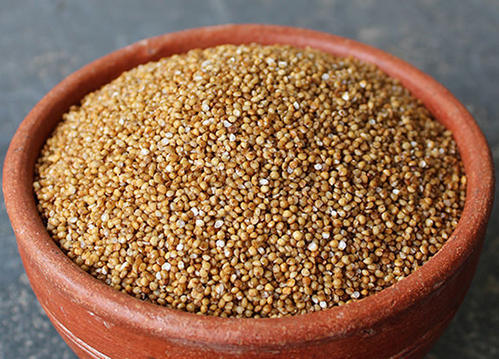New Delhi: The United Nations fund for agricultural development has complimented India for reviving focus on millets and exporting 1.8 million tonnes of wheat to 18 countries that faced an acute shortage of food last year in the wake of the war in Ukraine.
Alvaro Lario, the president of the International Fund of Agricultural Development (IFAD), also said that India’s G20 presidency has the potential to transform the global food systems as some of New Delhi’s focus areas are in sync with the UN body’s priorities.
In an interview to PTI, Lario, a noted development finance expert, said the Indian expertise could support the agricultural and rural development of other countries in the Global South.
“We also appreciate India’s exports of wheat – 1.8 million tonnes – to 18 countries facing an acute shortage last year in the wake of the war in Ukraine,” he said. Lario was in India to attend the G20 agriculture ministers meeting.
The IFAD is a specialised agency of the UN that has been focusing on financing projects in various poor and vulnerable countries to help them battle poverty, hunger, and food insecurity.
“India has also shown thoughtful leadership in South-South cooperation. I very much appreciate, for instance, India’s focus on the revival of millets,” he said.
“We’ve seen that millets are an important crop for farmers to adapt to climate change, given that they’re drought resistant, and to ensure nutrition in some of the poorest and most remote parts of the world,” Lario added.
The IFAD president said India can play a global role under its G20 presidency to transform global food systems.
“India’s G20 presidency has the potential to transform food systems. A food system includes all the aspects of feeding and nourishing people: growing, harvesting, packaging, processing, transporting, marketing, and consuming food,” he said.
“Food systems have been shaken to the core in the last few years -cumulative shocks have reversed years of progress and exposed their weaknesses,” he added.
The Covid-19 pandemic, war in Ukraine and climate change have severely impacted the global food security that has triggered a food crisis in the African countries.
India has been strongly flagging the consequences of the Ukraine conflict on the Global South, especially in areas of food, energy and fertilisers.
Ukraine has been a major global supplier of wheat and the Russian invasion of the country resulted in a global food crisis as the supplies were badly hit.
“The war in Ukraine has led to a humanitarian crisis. It has led to increasing food and fuel prices globally, which in turn is impacting the world’s most vulnerable people,” Lario said.
“In addition to limiting the provision of grains, it is limiting affordable access to energy and fertilisers. This has been catastrophic for the ability of small-scale farmers – who grow at least one-third of the world’s food -to keep producing food and also their ability to access markets,” he said.
Lario said the ripple effects of the war in Ukraine, compounded with other ongoing crises, are a reminder that there is a need to invest heavily in medium to long-term development to avoid being caught again in a similar “costly crisis”.
“The key areas identified by the Indian G20 presidency for food systems transformation – ensuring global food security and nutrition; promoting climate-smart agriculture; building inclusive and pro-poor value chains; and using digital technology to create smart solutions – are the same areas IFAD is concerned about,” he said.
He said at New Delhi’s invitation, IFAD has supported India to strengthen its focus and share its experience on local production systems and building markets and resilience.
“It is estimated that we need between $ 300 billion to $ 350 billion per year to revamp food systems. This is not even 3 per cent of the money wasted through the inefficiencies of the current global food systems each year,” Lario said.
“It is less than 0.5 per cent of the global GDP. The IFAD’s expertise and long-standing partnership with governments can help make public investment more efficient, and food systems more attractive to private investors,” he said.
The IFAD president also noted that small-scale farmers produce up to 70 per cent of the food consumed in low and middle-income countries and they often bear the brunt of climate change and other natural disasters.
“We need climate finance both to mitigate emissions and to help economies adapt to the change. The current pace of action is not enough to meet global commitments under the Paris Agreement.
“Between 2017 and 2018, small-scale producers received only $ 10 billion, or 1.7 per cent of climate finance.,” he added.
PTI
